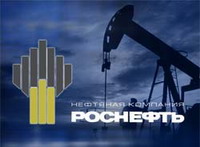Rosneft subsidiary wins major part of Yukos oil company
Rosneft subsidiary won the bidding for several Yukos units on Thursday with an offer of 175.7 billion rubles (US$6.8 billion; 5 billion EUR), the latest chapter in the piece-by-piece liquidation of the bankrupt oil company.

Neft-Aktiv submitted the highest bid for Tomskneft and a bundle of other assets that once belonged to Yukos, whose bankruptcy has allowed the Kremlin to expand its role in the global energy industry.
The sale of Tomskneft, which produces about 233,000 barrels of oil daily, is expected to further strengthen the government's control of what some analysts have called the "commanding heights" of the Russian economy. State-controlled energy companies have been the main beneficiaries of a series of Yukos auctions that began in March.
Rosneft beat another company, Yuniteks, in the bidding for Tomskneft. Two refineries - Angarsk and Achinsk - were also part of the lot, along with numerous smaller assets.
Russian media have previously linked Yuniteks to state-controlled gas monopoly Gazprom. Officials at OAO Gazprom and its oil unit Gazprom Neft declined to comment.
"This was a real, competitive fight," Nikolai Lashkevich, spokesman for the court-appointed bankruptcy supervisor, said after the sale. He called the fact that there were numerous bids "proof that there was competition."
Earlier Thursday, the little-known ZAO Promregionholding outbid two rivals for several relatively small properties that formerly belonged to Yukos, Russian news agencies reported.
Promregionholding paid 4.9 billion rubles (US$190 million; 140 million EUR) for the properties, which include stakes in five power companies in southern Russia as well as small exploration and refining interests.
The Russian media has linked Promregionholding to OAO Lukoil, a Kremlin-friendly, private corporation that is Russia's largest oil producer. Both companies have denied any connection, however, Dow Jones NewsWires reported.
Critics of the Kremlin have alleged that the government artificially manufactured some US$28 billion (21 billion EUR) in back tax claims against Yukos, which was once Russia's biggest oil producer. They say the move was chiefly aimed at transferring energy assets to companies controlled by or friendly to the Russian government.
Some have also called the jailing of Yukos' former owner Mikhail Khodorkovsky a calculated step to neutralize a potential political opponent to President Vladimir Putin.
The tax claims led to the acquisition of the company's key oil-producing unit by Rosneft after a disputed auction in 2004, and eventually to Yukos' bankruptcy in 2006. At its height in 2004, the tax and criminal charges against Yukos and Khodorkovsky battered investor confidence in Russia; foreign funds lost billions as the company's value evaporated.
But investors quickly forgot their jitters in the face of surging oil prices. Foreign oil companies are now clamoring to do deals with Rosneft and Gazprom, viewed as the state's gatekeepers to Russia's energy riches.
Yukos will largely disappear after its last production unit, refineries and its network of green-and-yellow filling stations go under the hammer on May 10.
In the first auction, Rosneft bought a block of its own shares for about 10 percent below their market value at the time; in early April Italian companies Eni SpA and Enel SpA won the bidding for a bundle of gas assets and promptly announced that they would sell the bulk of them on to Gazprom.
Oleg Maximov, an analyst with investment bank Troika Dialog, who valued Tomskneft at US$3.5 billion (2.6 billion EUR) and the refineries at nearly US$2 billion (1.5 billion EUR), said that the auction's start price of US$6.4 billion (4.7 billion EUR) was "a good, high price."
Meanwhile, Khodorkovsky's eight-year prison sentence has drawn few tears from the Russian public. Many see him as a robber baron who made billions in the economic chaos of the 1990s, while others saw their life savings vanish.
Apparently playing to that sentiment, Putin called in his state of the nation address last week for the proceeds raised from the sale of Yukos to be used to pay a part of a US$25 billion (18 billion EUR) program to build houses, roads and other infrastructure projects. Finance Minister Alexei Kudrin has said that the budget will receive about US$15 billion (11 billion EUR) from the auctions this year.
Subscribe to Pravda.Ru Telegram channel, Facebook, RSS!

